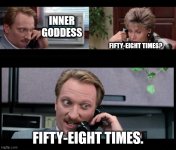MajorRewrite
Iffy
- Joined
- Mar 14, 2014
- Posts
- 4,313
A couple of authors on my “inexplicably popular” list: Mickey Spillane and Colleen Hoover. I think they’re both terrible.
Obviously millions of people do like them, so I must the odd one.
Obviously millions of people do like them, so I must the odd one.


